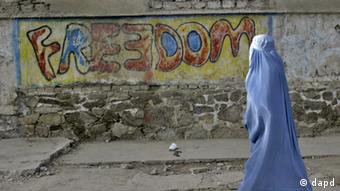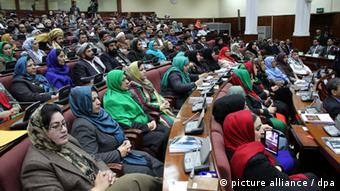Women human rights defenders in Afghanistan are facing mounting threats of violence and sexual assault, a new AI report found. Despite the gains made over the past decade, laws meant to support them exist on paper only.
"Anti-government groups are targeting prominent and outspoken women's rights advocates [in order to] spread fear among other women's rights activists [and] stop their activities." These are the words of Rohgul Khairkhwah, a woman elected as senator for Nimroz province in southern Afghanistan, and a recipient of the Ministry of Women's Affairs' "Bravest Woman in Afghanistan" award.
Her statements are part of an Amnesty International (AI) report released on Tuesday, April 7 in Kabul, which aims to take a look at the reality of women as rights defenders in the conflict-ridden country.
More violence
Based on interviews with more than 50 rights defenders and their families, the 71-page document titled, "Their lives on the line: Women rights defenders under attack in Afghanistan," illustrates the range of violence women human rights activists are confronted with on a daily basis - from threats, harassment and intimidation to physical attacks on their family members and property, and unlawful killings - despite the gains made over the past 13 years.
According to the document, the year 2013 saw a string of assaults carried out against high-profile women, with many of the perpetrators openly stating that the motivation of their attacks was that their female victims were working, or in public roles.

The Taliban and other armed opposition groups are responsible for the majority of human rights abuses
"These women are perceived as challenging existing power structures and defying cultural, religious and social norms concerning the role of women in society and, as such, are deliberately targeted, regardless of whether they are doctors, journalists, educators, female police officers or elected representatives," said the rights group.
The perpetrators
This mindset puts them at risk of sexual and other forms of gender-based violence and can further restrict their movements, as a female doctor quoted in the report pointed out. "The reason I have stopped going to work is that you can see the consequences if you don't listen to their warnings. I hope that by not working I will be safe. If the Taliban say they will do something they are serious about it. There is a security gap everywhere so I don't think it will be difficult for the Taliban to do something harmful."
But while the Taliban and other armed opposition groups are responsible for the majority of human rights abuses, the report found that they are not the only ones. "Many women rights defenders are facing attacks and intimidations from different sides including government officials, local warlords, from the Taliban and other armed insurgent groups and sometimes by their own family members," AI's Afghanistan Researcher Horia said in a DW interview.
In this context, the AI paper also accuses the Afghan authorities of being indifferent to the worsening situation and of "failing to create and enable" an environment for female human rights defenders to carry out their activities and to bring those responsible for abuses to justice.
A 'patchy' rights record
The report comes at a critical time in Afghanistan's history. With the end of the ISAF mission, the Afghan army and police are now fully in charge of security in a country plagued by conflict and a resurgent insurgency. But the NATO drawdown has also been followed by a reduction of economic and political support from the international community.
The rights group is now concerned that with international interest fading and foreign aid waning, the Afghan government will de-prioritize human rights amid growing economic hardship and instability, and that human rights, especially those of women and girls, will be traded off in the interests of security.
"The political and financial support of the international community should not be linked to the military presence in Afghanistan. We are calling on the international community to take women rights issue seriously and keep pressuring the Afghan government to protect women right defenders," said Mosadiq.
But what about the gains made over the past decade? The report argues that the government's record is "patchy" in terms of meeting its legal obligations under the UN Convention on the Elimination of all Forms of Discrimination against Women (CEDAW) and that, as a result, Afghanistan remains near the bottom of the UN Development Program Gender Inequality Index.
At the same time, AI says that conservative forces and ideas have slowly been increasing their positions and leverage within Afghan institutions, enabling them to intensify their attacks on women's rights. This is reflected in the 2013 election law, which rolled back the quota for women's representation in provincial councils from 25 percent to 20 percent, and removed it altogether for district councils.
It can also be seen in the response to the Elimination of Violence Against Women (EVAW) Law, which was decreed into law through an Executive Order by the former Afghan President Hamid Karzai in 2009, while parliament was in recess. When a female MP tabled it before parliament so that it would be passed there - and prevent Karzai's successor from just rescinding the decree - the move backfired as there was not enough support from MPs.
In a heated debate in parliament, the law was called "un-Islamic" and questions were raised about the minimum age of marriage for girls,the prohibition against forced marriage and the existence of shelters for abused women and girls, which were called "immoral."
In a heated debate in parliament, the law was called "un-Islamic" and questions were raised about the minimum age of marriage for girls,the prohibition against forced marriage and the existence of shelters for abused women and girls, which were called "immoral."
Not taken seriously
Moreover, police, prosecutors and courts allegedly refuse to take threats against women human rights defenders seriously, with few investigations into complaints of attacks, and even fewer prosecutions or convictions.
"This failure to respond effectively to the threats, harassment and attacks that women human rights defenders face is a result of weak state structures, particularly within the judiciary and law enforcement and security agencies. It is reinforced by an enduring culture of impunity, a judicial system based on the ability to wield power rather than on a concept of justice, and a multiplicity of overlapping and often-competing legal systems," said the report.
In this context, a woman provincial council representative was quoted by AI as saying: "I am supposed to have two bodyguards but I haven't seen them for a year. [Each time I have had them] after a few days the police come and take them away so you never know what's going on. This doesn't happen to my male colleagues."

The Elimination of Violence Against Women (EVAW) Law was called 'un-Islamic' during a heated debate in parliament in 2013
Mosadiq said double standards by the authorities towards men and women have led AI to the conclusion that both current and former Afghan governments "have failed to protect women and do not show a strong commitment to do so in the future."
In light of this development, the rights group stressed that laws and policies alone cannot achieve transformative social change. "The Afghan government must also demonstrate the political will and financial commitment to ensure that obligations on paper to protect the rights of women and girls translate into genuine protections on the ground."
Any action by the authorities should be undertaken with the meaningful participation of women human rights defenders and civil society, the rights group added.

No comments:
Post a Comment